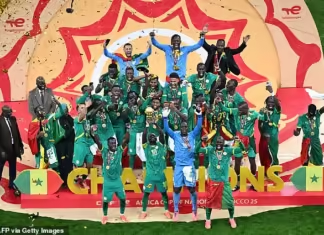A Russian foreign ministry plane has taken 32 children aged between one and three to Moscow from Iraq, where their mothers are in prison for alleged terrorism.
Russian authorities said the 32 toddlers had been held in Iraqi jails where their mothers are either serving out sentences or awaiting trial for membership of the Islamic State group.
The health ministry said the children, who arrived in Moscow late Monday, were taken straight to a hospital for medical tests.


A Russian foreign ministry plane has taken 32 children aged between one and three to Moscow from Iraq, where their mothers are in prison for alleged terrorism


Russian authorities said the 32 toddlers had been held in Iraqi jails where their m others are either serving out sentences or awaiting trial for membership of the Islamic State group


The health ministry said the children, who arrived in Moscow late Monday, were taken straight to a hospital for medical tests


Taking children to the National Medical Research Centre for Children’s Health of the Russian Healthcare Ministry after 32 kids aged between 1 and 3 years have been brought back to Russia from Iraq where they were held in prison




Monday’s group were among 122 minors, aged between one and 15 years, sent from Iraq to Russia since December last year, the authorities said, adding that the last such repatriation was in July
Monday’s group were among 122 minors, aged between one and 15 years, sent from Iraq to Russia since December last year, the authorities said, adding that the last such repatriation was in July.
Russian nationals were among the largest contingents of IS fighters. Most of the ‘returnees’ were women and children and are in Muslim-majority regions of the Caucasus, notably Chechnya.
Countries such as Britain and France have withdrawn the citizenship of Islamist fighters, while the Russian authorities, notably Chechen President Ramzan Kadyrov, have encouraged their return.


Russian nationals were among the largest contingents of IS fighters. Most of the ‘returnees’ were women and children and are in Muslim-majority regions of the Caucasus, notably Chechnya


Countries such as Britain and France have withdrawn the citizenship of Islamist fighters, while the Russian authorities, notably Chechen President Ramzan Kadyrov, have encouraged their return


But in early November, the head of the Russian intelligence agency FSB, Alexander Bortnikov, warned of the risks of the possible return of some 2,000 wives and children of Islamists who fought in Iraq and Syria


Taking children to the National Medical Research Centre for Children’s Health of the Russian Healthcare Ministry after 32 kids aged between 1 and 3 years have been brought back to Russia from Iraq where they were held in prison


Taking children to the National Medical Research Centre for Children’s Health of the Russian Healthcare Ministry after 32 kids aged between 1 and 3 years have been brought back to Russia from Iraq where they were held in prison
But in early November, the head of the Russian intelligence agency FSB, Alexander Bortnikov, warned of the risks of the possible return of some 2,000 wives and children of Islamists who fought in Iraq and Syria.
It is unclear who will take care of the children when they arrive back in Russia, or where they will be resettled.
There could be thousands of children in Iraq and Syria born to foreign fighters who have had nowhere to go since the caliphate began to crumble in 2016.
Foreign governments have been reluctant to repatriate ISIS suspects and their families, leaving authorities in Iraq and Syria to put them in camps or jails instead.


Taking children to the National Medical Research Centre for Children’s Health of the Russian Healthcare Ministry after 32 kids aged between 1 and 3 years have been brought back to Russia from Iraq where they were held in prison


Taking children to the National Medical Research Centre for Children’s Health of the Russian Healthcare Ministry after 32 kids aged between 1 and 3 years have been brought back to Russia from Iraq where they were held in prison
British authorities say approximately 850 people from the UK have travelled to support or fight for jihadist groups in Syria and Iraq.
Moscow has been proactive in trying to identify children of Russian origin as they said it would be dangerous to allow them to grow up in a radicalised environment.
Kuznetsova’s office said it had identified 123 Russian children in Iraq who required resettlement, and 699 Russian children across the region who had been ‘brought to the Middle East by their parents’ and could also return to Russia.
Approximately 5,000 Russians were believed to have flocked to the Islamic State group during its heyday earlier this decade. At its peak it held territory spanning most of northern Syria and Iraq, and claimed responsibility for terror attacks across Europe, Asia, and Africa.





















